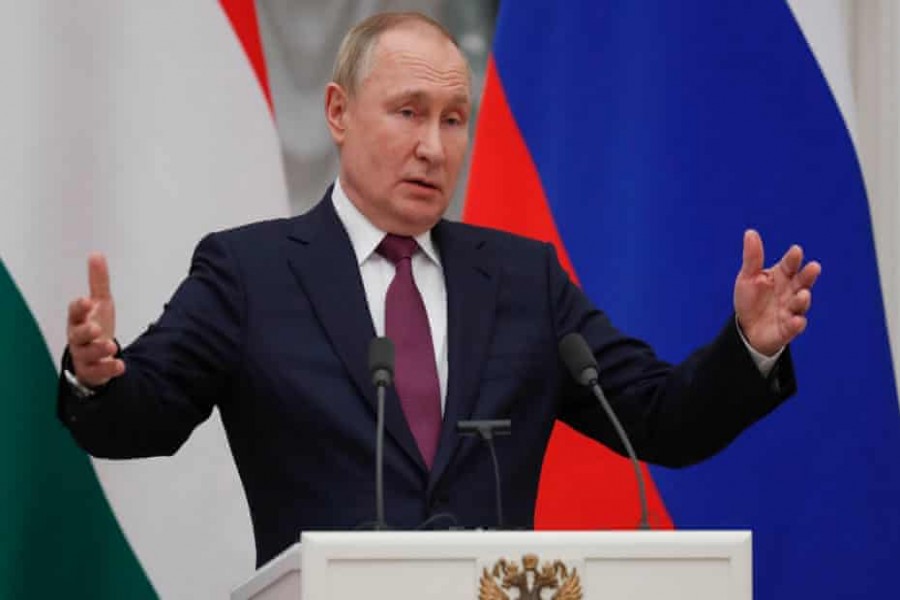If one is to believe what one sees the face off over Ukraine between the West (read the United States or US) and Russia has got stuck over certain security guarantees demanded. An undeclared but probable inclusion of Ukraine in the NATO (North Atlantic Treaty Organisation) umbrella effectively removes the buffer territory between Russia and any possible future conflict. Vladimir Putin has kept aloof of public statements barring one in which he categorically drew the stake in the sand. The flurry of diplomatic activity to scale down tensions appear normal except that they aren't. It's economic considerations that haven't been sorted out that is the bane.
Russia provides 230 cubic metres of gas per day to Europe, a third of that through Ukraine. Never comfortable with such a supply chain, Russia worked closely with Germany to build the Nord pipeline that circumvents Ukraine. That's what the US never liked. Over the last months a fleet of vessels have been travelling to Europe with LNG from the US. The idea is to ensure energy sufficiency to tide increased winter demand and prevent already inflated prices hitting the affordability quotient. Europe is already creaking at the seams over rising domestic costs. Germany and France aren't amused and have distanced themselves from the war cries. What the strategists are confronted with is how to make up any disruption of the energy supplies through. A fallback on Qatar, the second largest supplier after Australia has its own problems. The country already has advance agreements of supply for, among other regions Asia. The darker side of strategy suggests that Asia supplies might be diverted to Europe. Without being the same there lies a similarity with what Winston Churchill did with food grains during World War II, causing a famine in the then India. On the flip side, energy shortages in Asia will cause a combination of over-inflated domestic costs and spill-over prices overall.
From a business perspective, unless more moneys are freed up to enable consumer spending in wealthier countries, most Asian economies dependent on exports will be hit detrimentally. Thereby, lies the Catch 22 situation. The United States may see this as an opportunity to sell from their shale reserves. Saudi Arabia may well look at the prospect of withdrawing its opposition for an OPEC production cut given that prices are unlikely to slip.
It's no longer a hidden agenda that even less well-off countries are prepared to put their citizens under stress at the cost of geo-political interests. India's newly announced budget has aid provisions of Rs. 7.50 billion for Nepal, 6.0 billion for Myanmar, 4.0 billion for Sri Lanka and 3.0 billion for Bangladesh. That comes at the cost of a reduction in her Health Budget, Stimulus even as the Infrastructure Spend is ratcheted up manifold. Bangladesh has given out US$200 million loan to Sri Lanka, a lesser amount to the Maldives that like us, has been promoted to a middle-income country. All of such comes from the carefully built up foreign reserves that are healthy from our perspective. There are more demands on these for infrastructure projects. The reasoning is sound enough. The over $45 billion lie idle, imports aren't expected to create too much pressure and external interest rates are not attractive. Some of it is being ploughed back into the banking stream to keep the Taka from depreciating.
In the last budget, there was dismay at education and health allocations being only slightly increased. The massive and necessary stimulus packages took a lot of juggling to arrange. The low-interest loan parts haven't been paid back. Prospects of timely recovery aren't bright either. The silver lining comes in the form of reduced cost of mega-projects that are to be completed this year, ahead of the revised schedule. The government held hard to its position not to reduce fuel, especially diesel prices when they went down internationally. It did create bigger holes in people's pockets. The days of stable fuel prices aren't coming back anytime soon. All in all, the pain has to be absorbed now. How much more the citizen can stomach will be the defining factor. Let it not be a surprise if wage increases across the board become a major outburst.


